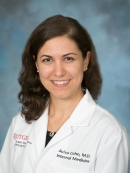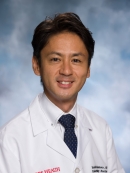
Division of Endocrinology, Metabolism and Nutrition
Message from the Chief
Our Division of Endocrinology provides the most advanced clinical care for endocrine diseases, is committed to training students, researchers, and physicians, and is strongly invested in basic and clinical investigations to advance our understanding and refine the therapy of endocrine diseases. Our physicians and scientists are passionate about changing how we treat endocrine diseases such as diabetes, obesity, and thyroid disease.
Please explore our website to learn about our division, and come to see us if you need dedicated and state-of-the-art medical care for an endocrine condition.
Christoph Buettner, MD, PhD
Professor of Medicine and Chancellor Scholar
Chief, Division of Endocrinology, Metabolism & Nutrition
Vice Chair for Basic Research
Our Mission
The Division of Endocrinology, Metabolism, and Nutrition provides care for patients with endocrine-related disorders, and diseases due to impaired hormone secretion or signaling. We are committed to training the next generation of endocrine specialists and researching prevention, causes, and treatments of endocrine and metabolic disorders such as diabetes and obesity.
The Division of Endocrinology is devoted to compassionate and state-of-the-art care of patients with endocrine diseases such as diabetes, obesity, disorders of cholesterol and lipid metabolism, pituitary and adrenal abnormalities, osteoporosis and other bone diseases, and thyroid and parathyroid disease.
Our tripartite mission is as follows:
- Provide state-of-the-art and comprehensive clinical service to our patients with endocrine disorders;
- Advance our understanding of diabetes and endocrinology through clinical and basic science research and
- Train physicians and other health care providers as well as researchers in the principles and practice of endocrinology.
Division Chief

Christoph Buettner, MD, PhD
Professor of Medicine and Chancellor Scholar; Chief, Division of Endocrinology & Vice Chair for Basic Research
Areas of Expertise Endocrinology, Metabolism, Diabetes
Emailcb1116@rutgers.edu
Clinical Faculty

Louis F. Amorosa, MD
Professor
Areas of Expertise Care of patients with type 2 diabetes and disorders of thyroid and calcium
Phone732-235-7219
Emailamoroslo@rutgers.edu

David Cohen, MD, FACE, FACP
Associate Professor and Department of Medicine Vice Chair of Education
Areas of Expertise Thyroid Disease, Cancer, Hypo & Hyperthyroidism, Nodules, Transgender Medicine
Phone732-235-7219

Sara E. Lubitz, MD
Associate Professor and Program Director
Areas of Expertise Pituitary, Thyroid & Women's Health
Phone732-235-7219

Anupam Ohri, MD, MBBS
Associate Professor
Areas of Expertise Diabetes Mellitus, Thyroid, Adrenal, Pituitary
PhoneOffice: 732-235-7219

Xiangbing Wang, MD, PhD
Professor
Areas of Expertise Thyroid & parathyroid disorders
Phone732-235-7219
Emailwangx9@rutgers.edu
Faculty Emeritus

Stephen Schneider, MD
Emeritus Clinical Professor
Research Faculty

Moshmi Bhattacharya
Associate Professor
Areas of Expertise Cell Signaling, Metabolism, Diabetes, Metabolic-Associated Steatotic Liver Disease (MASLD) and Cancer
PhonePhone: 732-235-5269
Emailmb1722@rutgers.edu
Affiliated Faculty

Steven Malin, PhD
Advanced Practice Nurses

Deanna Bilotti, RN, APN, FNP
Advance your Career
The Endocrinology Fellowship Program aims to prepare our fellows to be competent and caring physicians and give them the skills to incorporate new knowledge and methods into their practice. Visit the Endocrinology Fellowship Program page for details on how to apply.
Program Mission
Our mission is for fellows to acquire the knowledge and skills necessary for providing ethical, humanistic, high-quality, and cost-effective care of patients with diabetes and disorders of endocrinology and metabolism in the inpatient and ambulatory settings.
Clinical Training
The Division of Endocrinology, Metabolism and Nutrition offers an ACGME-accredited two-year fellowship starting July 1st of each year. The training program provides opportunities to observe and manage inpatients, outpatients and consults, along the spectrum of endocrine disease. Fellows are supervised and closely mentored by dedicated faculty.
Trainees are an integral part of the inpatient multidisciplinary cardiovascular surgery and heart and renal transplants teams. The fellows develop their procedural skills using an onsite DEXA machine, continuous glucose monitors and a thyroid ultrasound machine.
Education
In order to achieve the goals of the program, the twenty-four months of training are structured into two progressively advancing levels of competency-based objectives, with an aim of building the medical knowledge, technical skills and competencies of the trainee. The curriculum addresses the art, science and business of medicine, in addition to regularly scheduled conferences, including journal clubs, research presentations, case presentations and neurosurgery and endocrine surgery tumor boards.
Fellows are regularly involved in the educational training of residents and medical students. In addition, fellows have the opportunity to take part in both laboratory-based basic scientific research and clinical research programs in the division.
How to Apply
A two-year fellowship in Endocrinology, Diabetes and Metabolism is offered by the Division of Endocrinology, Metabolism and Nutrition beginning July 1st of each year. There are four fellows in the program with plans to increase to six by 2027, with responsibilities distributed according to the level of experience. Please apply for the three open 2026 Endocrinology fellowship positions via ERAS® This program also participates in the NRMP match.
ERAS® Requirements:
- Three or more letters of recommendation – to include an LOR from your residency program director;
- USMLE transcripts or COMLEX transcripts;
- Personal statement;
- Medical school transcript;
- ECFMS status report;
- MSPE; and
- Photo – if possible
Please contact Ms. Alicia Marty, Department of Medicine Fellowship Program Coordinator, with additional questions: alicia.marty@rwjms.rutgers.edu.
Additional Information
Accordion Content
-
The fellowship has strong educational, research and patient care components and is supported by the division’s full time and volunteer faculty. Training is based at Robert Wood Johnson University Hospital, New Brunswick, New Jersey, the primary teaching hospital of Robert Wood Johnson Medical School.
In order to achieve the goals of the program, the twenty-four months of training are structured into two progressively advancing levels of ACGME competency-based objectives, with an aim of building the medical knowledge, technical skills and competencies of the trainee.
Fellows in the Endocrinology, Diabetes and Metabolism training program will acquire expertise to care for patients with a vast diversity of endocrine and metabolic problems. Our emphasis is to provide fellows with solid medical knowledge and technical skills that will make you a clinically astute endocrinologist. This will prepare fellows for productive careers as general endocrinologists or subspecialists. Clinical training with academic faculty motivated for inquiry and scholarship will also prepare the fellow for academic endocrinology as a clinician or physician scientist. We feel that the more career options fellows have once they leave the program the better.
Through caring for our diverse patient population, fellows learn to treat a wide array of disease states including diabetes mellitus, obesity, thyroid conditions, bone and mineral metabolism disorders, adrenal and pituitary disorders.
The curriculum addresses the art, science and business of medicine. Weekly conferences include journal clubs, research presentations, a core didactic curriculum conference, case management conferences, and tumor boards.
Fellows are involved in the educational training of residents and medical students during their electives in our division and as preceptors in the physical diagnosis course.
Fellows participate in quality improvement/performance improvement projects and contribute to committees including but not limited to the graduate medical education committee, hospital diabetes committee, and hospital nutrition committee.
In addition, fellows have the opportunity to take part in both laboratory-based basic scientific research and clinical research projects in the division of Endocrinology, Department of Medicine, and Rutgers Biomedical and Health Sciences. Our fellows are funded to present their research at national conferences yearly.
We encourage the fellows to seek educational and professional experiences outside of our institution by joining regional and national professional societies and attending outside educational opportunities. We purchase a subscription to the Endocrine Society’s “Fellows Training Series” for each fellow which includes an in-training exam, online procedural training modules, and subspecialty modules. Fellows are supported to attend a board review course in their second year of training. Our faculty is well connected to several major national societies such as the ADA, ATA, Pituitary Society, Endocrine Society and AACE and we encourage fellows to begin long-term involvement in these premier societies.
The combination of the clinical activity, conferences and research opportunities creates a well-balanced program in which to develop in the field of endocrinology and launch successful careers.
-
Training takes place at the Rutgers Health faculty practice (outpatient) and Robert Wood Johnson University Hospital (inpatient). The training program provides opportunities to observe and manage a diverse population of inpatients, outpatients and consults along the spectrum of endocrine disease. Fellows are supervised and closely mentored by dedicated faculty.
Fellows rotate on inpatient consultation service, ambulatory clinic, and subspecialty/research blocks.
In the Rutgers Health faculty practice the fellows rotate through general endocrine and subspecialty clinics including osteoporosis, pediatrics, women's health, transgender and thyroid procedure clinics. Each fellow maintains a continuity clinic which provides them with the opportunity to learn the course of disease and develop long-term patient relationships. Our clinic has professional CGM, a DXA machine, an ultrasound machine, and a CDE always accessible to the fellows.
Our trainees are an integral part of the Robert Wood Johnson University Hospital multidisciplinary teams that care for patients undergoing cardiovascular surgery, heart transplants, kidney and pancreas transplants, stem cell transplants, bariatric surgery and pituitary surgeries.
As part of the Cancer Institute of New Jersey we often collaborate on patients with neuroendocrine tumors and immune related endocrinopathies.
We have the capabilities to treat our patients with radioactive iodine for hyperthyroidism and thyroid cancer, gamma knife radiosurgery, gender affirmation surgery and perform petrosal sinus sampling, adrenal vein sampling and parathyroid venous sampling.
-
Fellows may participate in research projects related to clinical, basic science or both with any of the fulltime faculty members in the division. Clinical trials sponsored by the National Institutes of Health and the pharmaceutical industry are routinely conducted in the division. Current faculty research interests include osteoporosis and other metabolic bone diseases, pituitary disease, hyperlipidemia, diabetes and obesity, exercise physiology, and thyroid disorders.
Recent Publications:
- Ten S, Bhangoo A, Buettner C. Tirzepatide for Congenital Generalized Lipodystrophy. N Engl J Med. 2025 Jan 29. doi: 10.1056/NEJMc2413871.
- Izarraras K, Shah A, Prasad K, Tan H, Zhou Z, and Bhattacharya M. Kisspeptin Mitigates Hepatic De Novo Lipogenesis in Metabolic-Dysfunction-Associated Steatotic Liver Disease, Cells; 2025; 14:1289.
- Meng L, Shapses SA, Wang X. Parathyroidectomy Reduces Inflammatory Cytokines and Increases Vitamin D Metabolites in Patients With Primary Hyperparathyroidism. Endocr Pract. 2025 Jan;31(1):52-58. doi: 10.1016/j.eprac.2024.10.005.
- Shah A, Xu H, Kwon H, Wondisford FE. In Vivo Glycerol Metabolism in Glycerol Kinase Deficiency Disease, Journal of Inherited Metabolic Disease Reports; 2024; 65: 392-400.
- L Meng, X Wang, JL Carson, Y Schlussel, SA Shapses. Vitamin D Binding Protein and Postsurgical Outcomes and Tissue Injury Markers After Hip Fracture: A Prospective Study. The Journal of Clinical Endocrinology & Metabolism 2024; 109 (1), e18-e24.
- Sakamoto K, Butera M, Zhou C, Maurizi G, Chen B, Shawkat A, Patlolla L, Thakker K, Calle V, Morgan D, Rahmouni K, Schwartz G, Tahiri A, Buettner C. Overnutrition causes insulin resistance and metabolic disorder through increased sympathetic nervous system activity. Cell Metab. 2024 Oct 15:S1550-4131(24)00376: PMID: 39437790.
- Buettner C, Sakamoto K, Butera A. M. Why do some individuals with obesity remain metabolically healthy? Trends Endocrinol Metab.; 2024 Jul 2:S1043-2760(24)00176-0 PMID: 38960837.
- Cohn AY, Grant LK, Nathan MD, Wiley A, Abramson M, Harder JA, Crawford S, Klerman EB, Scheer FAJL, Kaiser UB, Rahman SA, Joffe H. Effects of Sleep Fragmentation and Estradiol Decline on Cortisol in a Human Experimental Model of Menopause. J Clin Endocrinol Metab. 2023 Oct 18;108(11):e1347-e1357. doi: 10.1210/clinem/dgad285. PMID: 37207451; PMCID: PMC10584010.
- Bisno DI, Lubitz S, Marshall I, Cohen DA. A National Survey of United States-Based Endocrinologists Who Prescribe Gender-Affirming Hormone Therapy. Endocr Pract. 2023 Jun;29(6):465-470. doi: 10.1016/j.eprac.2023.03.003. Epub 2023 Mar 9. PMID: 36906069.
- Correa R, Miragaya J, Cohen DA, Hoang TD, Jasim S, Lieb DC, Weber SL, Bird MD, Stec C; Clinical Practice Guidelines Oversight Committee. Protocol for Development of American Association of Clinical Endocrinology Clinical Practice Guidelines and Consensus Statements: Summary of Methodology, Process, and Policy - 2023 Update. Endocr Pract. 2023 May;29(5):341-348. doi: 10.1016/j.eprac.2023.01.012. PMID: 37150580.
- Bassin SR, Lubitz S. Integrating Basic Science into Endocrine Clinical Electives. Med Sci Educ. 2023 Jun 30;33(4):835-839. doi: 10.1007/s40670-023-01824-w. PMID: 37546212.
- Zhou C, Ruiz HH, Ling L, Maurizi G, Sakamoto K, Liberini CG, Wang L, Stanley A, Egritag HE, Sanz SM, Lindtner C, Butera MA, Buettner C. Sympathetic overdrive and unrestrained adipose lipolysis drive alcohol-induced hepatic steatosis in rodents. Mol Metab. 2023 Sep 29;78:101813. PMID: 39437790.
- Grant LK, Coborn JE, Cohn A, Nathan MD, Scheer FAJL, Klerman EB, Kaiser UB, Harder J, Abramson M, Elguenaoui E, Russell JA, Wiley A, Rahman SA, Joffe H. Sleep Fragmentation and Estradiol Suppression Decrease Fat Oxidation in Premenopausal Women. J Clin Endocrinol Metab. 2022 Jul 14;107(8):e3167-e3176. doi: 10.1210/clinem/dgac313. PMID: 35569055; PMCID: PMC9282266.
- Kim H, Shah K, Buettner C. Use of Patient-Reported Outcomes for Assessing Diabetes Outcomes. Endocrinol Metab Clin North Am. 2022 Dec;51(4):781-793. doi: 10.1016/j.ecl.2022.05.001.
- Shah A, Wang Y, Wondisford FE; Differential Metabolism of Glycerol Based on Oral and Intravenous Administration in Humans, Metabolites; 2022; 12:890.
- Cohen DA, Ricotta DN, Parikh PD. Things we do for no reason™: Routinely holding metformin in the hospital. J Hosp Med. 2022 Mar;17(3):207-210. doi: 10.12788/jhm.3644. PMID: 34424186.
- Sullivan AM, Beltran CP, Ranchoff BL, Hayes MM, Atkins KM, Tibbles CD, Cohen AP, Cohen DA, Huang GC, Schwartzstein RM; Clinician Educator Research Group. Enhancing Clinical Teaching in Critical Thinking, High-Value Care, and Health Care Equity. J Contin Educ Health Prof. 2022 Jul 1;42(3):164-173. doi: 10.1097/CEH.0000000000000441. PMID: 36007516.
- Bassin SR, Kohm K, Fitzgerald N, Cohen DA. An Assessment of Nutrition Education in Endocrinology Fellowship Programs in the United States. Endocr Pract. 2022 Mar;28(3):310-314. doi: 10.1016/j.eprac.2021.12.012. Epub 2021 Dec 26. PMID: 34965450.
- Cohn A, Nehs M, Chan J, Vaidya A. Casting a Wide Net. N Engl J Med. 2021 Apr 1;384(13):e50. doi: 10.1056/NEJMimc2028852. PMID: 33789015.
- Watari J, Vekaria S, Lin Y, Patel M, Kim H, Kang F, Lubitz S, Beninato T, Laird AM. Radiology report language positively influences adrenal incidentaloma guideline adherence. Am J Surg. 2022 Feb;223(2):231-236. doi: 10.1016/j.amjsurg.2021.06.015. Epub 2021 Jun 29. PMID:34243951.
- Scherer T, Sakamoto K, Buettner C. Brain insulin signalling in metabolic homeostasis and disease. Nat Rev Endocrinol. 17:468-488-483; 2021. PMID: 34108679.
- Bassin SR, Amorosa L. Prophylactic Antithyroid Treatment Prior to Contrast Imaging in Hyperthyroid Patients. Endocr Pract. 2021 Jul;27(7):757-759. doi: 10.1016/j.eprac.2021.03.003. Epub 2021 Mar 9. PMID: 33711486.
-
- USMLE steps
- ABIM board certified or board eligible
- NJ license (limited license if on visa)
- A valid ECFMG certificate for all foreign medical graduates
- Completion of a prior internal medicine residency
-

Renata Marques Jones, MD
Fellowship Year 5
Medical School: Centro Universitario Lusiada
Residency: St. Barnabas Hospital Program
Nikolina Markovic, MD
Fellowship Year 6
Medical School: University of Belgrade Faculty of Medicine
Residency: Rutgers Health/New Jersey Medical School Program
Fatema Arafa, MD
Fellowship Year 4
Medical School: SUNY Upstate
Residency: Northwell Staten Island University Hospital
Nestor Rodriguez-Morales, MD
Fellowship Year 4
Medical School: University of Puerto Rico School of Medicine
Residency: Temple University -
- Michelle Sheyman, MD - Assistant Professor of Medicine, Zucker School of Medicine at Hofstra Northwell Health, NY
- Carlos Rivera, MD - Assistant Professor of Medicine, University of Arizona Banner Health, AZ
- Maryam Bojarian, MD - Assistant Professor of Medicine, New York Medical College Westchester Medical Center, NY
- Tiffany Purewal, MD - Private Practice, San Antonio, TX
- Mina Botros, MD - Assistant Professor of Medicine, Zucker School of Medicine at Hofstra Northwell Health, NY
- Iqra Farooqi, MD - Private Practice, FL
- Mangaiyarkkarsi Sivakumar, MD - Private Practice, NJ
- Manthan Pandya, MD - Division Chief of Endocrinology, Trinitas Regional Medical Center, NJ
- Niharika Yedla, MD – Clinical Instructor, Southern Illinois University, Quincy, IL
- Chukwuka Akamnonu, MD - Private Practice, Glendale, CA
- Sahil Parikh, MD - Private Practice, Los Angeles, CA
- Julie Zaidan, MD - Assistant Professor, Donald and Barbara Zucker School of Medicine at Hofstra Northwell Health, NY
- Abeera Khan, MD - AtlantiCare, Egg Harbor, NJ
- Najaf Asrar, MD - Private Practice, North Brunswick, NJ
- Juman Takeddin, MD - Private Practice, Raleigh, NC
- Sima Patel, MD - Lead Scientific Director Medical Affairs North America, Recordati Rare Diseases, NJ
- Navinder Jassil, MD - Assistant Professor of Medicine at Cooper Medical School at Rowan University, NJ
- Garima Thapar, MD - Private Practice, Voorhees, NJ
- Lissette Cespedes, MD – Medical Director Global Medical Affairs Rare Disease, Pfizer, NY
- Jorge Vivar Aguirre, MD - Private Practice, Salisbury, MD
- Pegah Yousefzadeh, DO - Private Practice, Lake Success, NY
- Lyudmila Shvets-Gabriel, MD - White Plains Hospital Physician Associates, NY
- Amy Chow, MD - UCLA Health, Thousand Oaks, CA
- Anupa Sharma, DO – Section Chief of Endocrinology, Penn Medicine Princeton Health; Clinical Assistant Professor of Medicine at Rutgers Robert Wood Johnson Medical School, NJ
RWJ Diabetes Service
The Division of Endocrinology, Metabolism, and Nutrition at Rutgers Robert Wood Johnson Medical School is committed to supporting individuals with diabetes. Our mission is to deliver exceptional and personalized care, drive scientific advancements, educate patients, and train the next generation of endocrinologists.
Diabetes Mellitus is a chronic medical condition in which the body is unable to properly regulate the amount of sugar (glucose) in the blood. Insulin, produced by the pancreas in the abdomen, helps regulate blood glucose levels. Diabetes occurs when there is either too little insulin available, resistance to the insulin, or both.
Types of Diabetes We Manage
Regardless of the type of diabetes you have, we possess the knowledge and experience to help you achieve your health goals.
- Type 1 diabetes (T1D): The body does not produce insulin due to an autoimmune process that limits the pancreas’s ability to make insulin. Type 1 diabetes is also called juvenile-onset diabetes, as it often develops during childhood. However, diagnosis can occur at any age. Insulin injections or the use of an insulin pump are needed.
- Type 2 diabetes (T2D): Most people with diabetes have type 2 diabetes, which is characterized by insulin resistance, where the body does not respond to available insulin effectively. Type 2 diabetes is often associated with increased weight, high blood pressure, and high cholesterol, and we can help manage all these conditions with you.
- Gestational diabetes: Hormonal changes during pregnancy can lead some women to develop gestational diabetes, which can lead to complications for both the mother and the developing fetus. Our endocrinologists work closely with your obstetricians and maternal-fetal physicians to help control blood sugar levels during this critical time.
- Other causes: Less common forms of diabetes include:
- Drug-induced diabetes – due to side effects from medications, including glucocorticoid steroids, specific cancer therapies, and organ transplant medications.
- Conditions that affect the pancreas, including pancreatitis, pancreatic cancer, and cystic fibrosis.
- Maturity-onset diabetes of the young (MODY) – This is also called monogenic diabetes due to genetic mutations that impact the body’s ability to make insulin appropriately.
Why Diabetes Care is Critical
Diabetes is a chronic disease, meaning if left untreated, it can lead to serious complications. Diabetes is the primary cause of blindness, amputations, and kidney disease requiring dialysis. Additionally, having diabetes increases the risk of heart attack, stroke, and neuropathy. Controlling the blood sugar levels can lower the chance of these outcomes.
How We Approach Diabetes Care
Our philosophy is to empower patients with the knowledge and tools to manage their blood sugar, optimize their health, and minimize the risk of complications. We achieve this through a comprehensive approach to diabetes care, which includes education, technology, nutrition counseling, and exercise guidance.
- Comprehensive diabetes self-management education involving blood glucose monitoring, insulin injection therapy, and the use of non-insulin medications
- Access to the latest diabetes technologies, including continuous glucose monitoring and insulin pumps
- Dietary and nutrition counseling with individualized recommendations
- Exercise guidance
- Support and guidance to caregivers, including remote monitoring and medication administration
- Working closely with our pediatric endocrine colleagues to assist patients in the transition from pediatric to adult medicine
- Dedicated inpatient diabetes team for patients hospitalized at Robert Wood Johnson University Hospital in New Brunswick, NJ, with assistance in post-discharge care
- Close communication with primary care providers to ensure coordination of care
- Refer to other specialists, including nephrologists, ophthalmologists, neurologists, hepatologists, cardiologists, podiatrists, and bariatric surgeons.
Choosing RWJ for Your Diabetes Care
When you choose Robert Wood Johnson Medical School for your diabetes care, you choose a team that is dedicated to your well-being. You will receive the following benefits, each designed to make your journey with diabetes as smooth as possible.
- American Diabetes Association (ADA) Certified Center of Excellence staffed with Certified Diabetes Educators.
- Close to home – Our providers take care of patients in New Brunswick and Monroe, NJ. We also provide telehealth visits for patients throughout the state.
- Academic endocrinologists – Our faculty are employed by Rutgers University and strive to use an evidence-based approach, informed by the current literature.
- Team-based care – Our team comprises experienced physicians, nurse practitioners, certified diabetes educators, and other healthcare professionals to help meet the needs of patients living with diabetes.
- Access to clinical trials and cutting-edge research – Our faculty lead or collaborate with other Rutgers scientists on multiple metabolic studies, and you may be able to participate in them if you desire. Our research aims to understand the causes of diabetes better, leading to the development of effective prevention measures and innovative treatment strategies.
Women's Health Clinic
We care for women experiencing a wide range of hormone-related symptoms or conditions including:
- Irregular menstrual cycles
- Polycystic Ovarian Syndrome (PCOS)
- Menopausal symptoms
- Elevated prolactin levels
- Premature ovarian insufficiency
- Hypothalamic amenorrhea
- Thyroid disease in pregnancy
Hormonal changes can occur throughout a women’s life, leading to symptoms such as irregular menstrual cycles, elevated androgens or “male like hormones”, or low estrogen during menopause.Dr. Aviva Cohn, a board-certified endocrinologist with clinical and research expertise in women’s related endocrine disorders provides comprehensive care tailored to each patient.
What do irregular menstrual cycles mean?
During their reproductive years, monthly menstrual periods depend on a finely tuned balance of hormones as they cycle throughout the month. Persistent irregularity in the menstrual cycle can signal hormonal imbalance. At our women’s health clinic, we will perform a thorough evaluation of your symptoms and check relevant hormones to determine the underlying cause.
I think I have PCOS. What does this mean?
PCOS presents in many different ways. It is caused by hormonal imbalance that may result in:
- Irregular menstrual cycles
- Elevated levels of androgens leading to acne, excess facial hair scalp hair thinning.
- Insulin resistance and weight gain
I am middle-aged and experience hot flashes that interfere with daily life. What can I do?
During the menopause transition, changes in reproductive hormones often cause hot flashes and other symptoms. These are common, but can be very debilitating. Effective treatments are available including both hormonal and non-hormonal options to help alleviate your symptoms.
If you have any questions or would like to make an appointment, call 732-235-7219.
Pituitary Center
Robert Wood Johnson Medical School is home to one of the only dedicated Pituitary Centers in New Jersey. Our multidisciplinary team of expert endocrinologists, neurosurgeons, and radiation oncologists provides comprehensive care for the full spectrum of pituitary disorders, including:
- Acromegaly
- Cushing’s disease
- Prolactinoma
- Pituitary tumors
- Hypopituitarism
We offer a wide range of advanced treatment options, including medical therapy, surgical intervention, and state-of-the-art stereotactic radiosurgery. Our endocrinologists specialize in managing the hormonal imbalances associated with pituitary disorders, tailoring medication regimens to each patient’s unique needs.
In addition, participation in clinical trials allows our patients access to novel and promising therapies while contributing to the advancement of pituitary disease research.
Through collaboration, innovation, and compassionate care, the Robert Wood Johnson Pituitary Center is committed to improving outcomes and quality of life for all individuals affected by pituitary disorders.
Transgender Center
As part of the PROUD Gender Center of New Jersey, the Division of Endocrinology’s Transgender Clinic is dedicated to providing exceptional, compassionate and affirming care to our transgender and gender-diverse patients. Since its founding in 2020, our clinic has become the largest gender-affirming hormone therapy medical program in the region. We are honored to have been recognized by The Human Rights Campaign Foundation for our commitment to excellence in care, receiving the Leaders in LGBTQ+ Healthcare Equality recognition five consecutive times.
Our Services
We offer a comprehensive range of services to support patients throughout every stage of their journey:
- Treatment Counseling: Our experienced clinicians provide personalized counseling to help you explore and understand your treatment options, empowering you to make informed decisions about your care.
- Medical Treatment: We specialize in gender-affirming hormone therapy, developing individualized treatment plans tailored to each patient’s goals and medical needs.
- Treatment Monitoring: Regular hormone level assessments ensure that therapy remains safe, effective, and aligned with your transition goals.
- Referrals to Additional Care Services: We collaborate with a broad network of specialists to offer integrated care, including surgical consultations, reproductive health, mental health support, and more.
- Care Coordination: Our dedicated coordination team streamlines your experience, ensuring smooth communication among all members of your healthcare team.
Meet Our Team
Our multidisciplinary team of physicians combines expertise, compassion, and a deep commitment to providing gender-affirming care:
We are here to support you with compassionate care and expertise.
Buettner Lab
Buettner Lab studies mechanisms of central control of peripheral metabolism and how this is altered in metabolic disease. We employ integrated physiology approaches to deconstruct the role of the brain in orchestrating organ crosstalk such as nutrient flux between adipose tissue and the liver and its relevance in regulating insulin action.
We aim to elucidate the role of the sympathetic nervous system (SNS), adipose tissue lipolysis, lipotoxicity, glucose counter-regulation, and neuroinflammation in the pathophysiology of diabetes and obesity. These studies may provide important insights into mechanisms that drive the development and progression of metabolic disease and allow the identification of novel therapeutic approaches for the treatment of obesity and diabetes.
Christoph Buettner, MD, PhD
Principal Investigator
Professor of Medicine and Chancellor Scholar
Chief, Division of Endocrinology, Metabolism & Nutrition
Vice Chair for Basic Research
Division of Endocrinology, Metabolism & Nutrition
Department of Medicine
Robert Wood Johnson Medical School
Rutgers University
cb1116@rutgers.edu
Research Projects
-
We study the role of the SNS in the regulation of adipose tissue and liver function and mechanisms through which chronic dysregulation of catecholamine levels and sympathetic outflow to peripheral metabolic organs can contribute to insulin resistance, hyperglycemia, and systemic inflammation. To this aim, we are developing novel methods to monitor SNS activity in peripheral metabolic organs in real time in vivo and have developed inducible loss of function models to study the function of the SNS.
-
We are characterizing the physiological role of hypothalamic inflammation in metabolic homeostasis, specifically the role of microglia, the gut-brain axis, and interferon gamma in counterregulation. We aim to determine to what extend dysregulation of counterregulatory mechanisms contributes to insulin resistance in obesity and diabetes.
-
The aim of this project is to study the effect of TBI-induced neuroinflammation in the CNS control of peripheral metabolism as well as the contribution of metabolic dysregulation to chronic neuroinflammation in TBI.
-
As AD is increasingly understood as a neuroinflammatory disease with possibly important metabolic drivers, we wish to examine the role of adipose tissue function and lipotoxicity and brain insulin signaling on cognition and neuroinflammation.
-
Circadian rhythms regulate many biological processes such as metabolism and cognition. We are interested to understand how the central clock synchronizes with peripheral clocks, if light exposure can be used to reentrain circadian rhythms in both rodents and humans and if this improves metabolism and cognition.
Clinical Projects
-
Dr. Buettner is currently conducting a clinical study to determine whether a long-term tailored light intervention that promotes entrainment can improve sleep disturbances, inflammation, insulin sensitivity, glucose disposal, and cognition in patients with mild cognitive impairment.
-
The aim of this project is to study the effect of TBI-induced neuroinflammation in the CNS control of peripheral metabolism as well as the contribution of metabolic dysregulation to chronic neuroinflammation in TBI. Based on our finding that rodents develop impaired glucose homeostasis after TBI, we are currently conducting a retrospective chart review in collaboration with the Icahn School of Medicine at Mount Sinai to determine the incidence of prediabetes and diabetes in patients with a history of TBI and thus determine the translational relevance of our findings in rodents.
-
Preclinical studies in Dr. Buettner’s lab have shown that certain antibiotics, which alter the gut microbiome composition and modulate the inflammatory environment in the hypothalamus, lead to impaired glucose counterregulation to hypoglycemia or neuroglycopenia. The purpose of this study is to assess the translational relevance of our findings in rodents and investigate the association between specific antibiotics and the risk of hypoglycemia in the inpatient population at RWJMS.
Selected Publications
Overnutrition causes insulin resistance and metabolic disorder through increased sympathetic nervous system activity
Kenichi Sakamoto, et al. Cell Metabolism. 2024 Oct 15:S1550-4131(24)00376-0. doi: 10.1016/j.cmet.2024.09.012. PMID: 39437790.
Brain insulin signalling in metabolic homeostasis and disease
Thomas Scherer, et al. Nature Reviews Endocrinology. 2021 Aug;17(8):468-483. doi: 10.1038/s41574-021-00498-x. PMID: 34108679.
Alternatively activated macrophages do not synthesize catecholamines or contribute to adipose tissue adaptive thermogenesis
Katrin Fischer, et al. Nature Medicine. 2017 May;23(5):623-630. doi: 10.1038/nm.4316. Epub 2017 Apr 17. PMID: 28414329.
Binge drinking induces whole-body insulin resistance by impairing hypothalamic insulin action
Claudia Lindtner, et al. Science Translational Medicine. 2013 Jan 30;5(170):170ra14. doi: 10.1126/scitranslmed.3005123.
Brain insulin controls adipose tissue lipolysis and lipogenesis
Thomas Scherer, et al. Cell Metabolism. 2011 Feb 2;13(2):183-94. doi: 10.1016/j.cmet.2011.01.008.
Shah Lab
The Shah Lab investigates metabolic disorders, including diabetes mellitus, obesity, and fatty liver disease. Through patient-centered translational studies, the lab aims to uncover the underlying causes of these conditions and develop innovative treatments to improve patient outcomes. With specialized expertise in isotope tracing, the research team studies metabolic flux in humans. Current programs explore gluconeogenesis substrate utilization, often recruiting participants through the medical school's endocrinology clinics. These efforts leverage diverse medical school resources, including the Clinical Research Center and the Metabolomics Core.
For more information regarding this research, please contact the Principal Investigator, Ankit Shah, MD.
Ankit Shah, MD
Principal Investigator
Assistant Professor of Medicine
Division of Endocrinology, Metabolism & Nutrition
Department of Medicine
Robert Wood Johnson Medical School
Rutgers University
ashah386@rwjms.rutgers.edu
Research Projects
- Gluconeogenesis substrate utilization in humans
- Role of kisspeptin in metabolic dysfunction-associated liver disease (collaboration with Bhattacharya Lab)
- Impact of exercise on vascular and metabolic function (collaboration with Malin Lab)
Selected Publications
In vivo glycerol metabolism in patients with glycerol kinase deficiency
Ankit Shah, et al. Journal of Inherited Metabolic Diseases Reports. 2024 Sep 17;65(6):392-400. doi: 10.1002/jmd2.12452. eCollection 2024 Nov.
Gluconeogenesis flux in metabolic disease
Ankit Shah, et al. Annual Reviews Nutrition. 2023 Aug 21:43:153-177. doi: 10.1146/annurev-nutr-061121-091507.
Glycerol's contribution to lactate production outside of a glucose intermediate in fasting humans
Ankit Shah, et al. Metabolism. 2022 Jul:132:155214. doi: 10.1016/j.metabol.2022.155214. Epub 2022 May 11.
Metabolic Phenotyping Core
The Metabolic Phenotyping Core Facility provides investigators with services to comprehensively assess metabolism in rodents. This is particularly relevant if one is interested in understanding the role of genes or drugs in controlling metabolism, and given the huge cost of the obesity and diabetes epidemic, this has potential relevance to many investigators at Rutgers who do not work on metabolism but may have stumbled upon a metabolic phenotype that may potentially have relevance for obesity and diabetes.
We provide advice on experimental design and metabolic phenotyping capabilities such as Indirect calorimetry, body composition, metabolic turnover studies, and hyperinsulinemic-euglycemic clamp analysis in live animals, which includes data analysis and interpretation. Do not hesitate to contact us if you are considering using our services.
Featured Services
-
To assess energy homeostasis, including oxygen consumption, CO2 production, respiratory exchange ratio through indirect calorimetry, and food intake and activity monitoring.
The core can perform indirect calorimetry for up to 24 animals in parallel (8 Comprehensive Laboratory Animal Monitoring System (CLAMS, Columbus Instruments) and 16 TSE metabolic cages). Eight of these indirect calorimetric cages are placed in one environmental chamber that allows the manipulation of the ambient temperature where the animals can be housed at a set temperature in a range from 4°C to 30°C to assess how metabolism is regulated during cold exposure or thermoneutrality commonly believed to be around 28°C.
The latter is important as the ambient temperature influences many metabolic functions, and the argument has been made that mice are under constant moderate cold stress at room temperature, which changes the susceptibility to fatty liver and metabolic disease. Hence, conventionally housed mice are not a good model for human disease since humans wear clothes and do not experience cold stress.
Thus, it is informative to study mice at thermoneutrality as a more suitable model for human conditions, which the environmental chamber allows. The profound impact of ambient temperature on experimental outcomes is now appreciated in the metabolism and, for example, in the immunology field.
-
The lean and fat mass ratio is critical to studying/understanding energy homeostasis and metabolic disease. The EchoMRI uses MRI to measure lean mass, fat mass, and free water content in restrained conscious mice. Body composition is assessed without anesthesia in less than three minutes. This can be repeated to confirm reproducibility and serially monitored for the effect of an obesity or drug treatment and/or specific gene ablation in metabolic control.
-
To determine metabolic flux and the turnover rate of specific molecules and the contribution of labeled substrates to metabolism and metabolic control, the core provides metabolomics analysis using stable-isotope labeled tracer infusion and LC/MS. Tracers are infused through the right jugular vein to establish and maintain a steady state for 6h, and serum samples are collected and derivatized to analyze with LC/MS (Metabolomics Core conducts LC/MS).
Enrichment of metabolites and flux analysis is conducted to determine the distribution of specific carbon sources and the turnover rate of metabolites. These results provide fundamental metabolic information in diabetes, NAFLD, cardiovascular disease, and cancer. Metabolomics analysis is a critical technique to overcome the limitation of traditional metabolomics studies such as bolus injection because infusion maintains a steady state of metabolism, and state of the art LC/MS system enables determination of the enrichment and flux rate of many metabolites in the same sample.
-
The core provides a hyperinsulinemic-euglycemic clamp using a stable-isotope labeled 6,6-D2 glucose infusion and LC/MS to study glucose metabolism and insulin action in mice. 6,6-D2 glucose is infused through the right jugular vein for 3h for basal clamp and then 6,6-D2 glucose plus insulin and 50% (w/v) glucose are infused for 3h to maintain euglycemia. The serum is collected to determine glucose enrichment and turnover rate using LC/MS.
This result provides key parameters of insulin action such as the glucose infusion rate and the rate of hepatic glucose production in the basal state and the hyperinsulinemic clamp period. Hyperinsulinemic euglycemic clamp in this core uses a stable-isotope labeled tracer instead of traditional radioisotope and LC/MS, providing more accurate results and a safer methodology as no radioactivity is involved.
Support Team
Scientific Director
Christoph Buettner, M.D., Ph.D.
Professor and Division Chief
Division of Endocrinology, Metabolism and Nutrition
Department of Medicine
Rutgers-Robert Wood Johnson Medical School
Executive Director
Azeddine Tahiri
Lab Manager
Division of Endocrinology, Metabolism and Nutrition
Department of Medicine
Rutgers-Robert Wood Johnson Medical School
Email: azeddine.tahiri@rutgers.edu
Equipment
The Metabolic Phenotyping Core Facility, housed within the Child Health Institute of New Jersey's animal facility, offers the following advanced instrumentation:
- Columbus Instruments Oxymax-CLAMS: Eight cages for indirect calorimetry.
- TSE Systems PhenoMaster: Sixteen cages with environmental chambers for indirect calorimetry.
- EchoMRI-100: Whole-body composition analyzer.
- Infusion Pumps and Tether Systems: For stable isotope tracer infusion.
- Anatomical Microscope and Surgery Stations: Designed for precision research.
- Teledyne FLIR T530 Thermal Camera: For thermal imaging applications.
The Metabolic Phenotyping Core Facility provides state-of-the-art resources for metabolic research and phenotyping studies.
Core Pricing
| Services | Academic Int. | Academic Ext. | Industry |
|---|---|---|---|
| Body composition | 18 | 30 | 42 |
| Tolerance test (Glucose, insulin, pyruvate and glycerol | 36 | 60 | 84 |
| Jugular vein catheter implantation surgery | 180 | 300 | 420 |
| Arterial catheter implantation surgery | 180 | 300 | 420 |
| Jugular vein and arterial catheter implantation surgery | 240 | 400 | 560 |
| Indirect calorimetry | 180 | 300 | 420 |
| Indirect calorimetry with environmental chamber | 240 | 400 | 560 |
| Indirect calorimetry analysis | 60 | 100 | 140 |
| Euglycemic clamp | 240 | 400 | 560 |
| Euglycemic clamp analysis (LC/MS and data analysis) | 60 | 100 | 140 |
| Infusion of stable-isotope tracers and serum preparation for metabolomics | 120 | 200 | 280 |
| Metabolomics analysis (sample derivatization, LC/MS and data analysis) | 60 | 100 | 140 |
| FLIR Thermal Imaging | 18 | 30 | 42 |
Important Notes:
1. All listed prices are in USD and are quoted per sample/mouse.
2. LC/MS and MS data analysis are performed at the Metabolomics Core (New Brunswick) under the supervision of Xiaoyang Su, Ph.D.
3. Investigators are responsible for providing stable-isotope tracers, including 13C6-Glucose, 2D-Glucose, 13C3-pyruvate, 13C3-lactate, and 13C3-glycerol, for metabolomics studies.
Contact Us
Appointments
To schedule an appointment, discuss experiments, or request pricing information, please get in touch with Azeddine Tahiri via email at azeddine.tahiri@rutgers.edu.
Offices
125 Paterson Street, 7th Floor, Room #7120
Clinical Academic Building
Rutgers University
New Brunswick, NJ 08901
Metabolomics Core
Metabolomics is the quantitative characterization of metabolites. The metabolome represents the collection of all metabolites in a biological system, such as cell, tissue, organ or organism. Metabolites are not only substrates and products of biochemical reactions; many of them also serve as regulators of enzymatic activities. Metabolite levels reflect the balance between production and consumption. Stable-isotope tracers allow more direct measurement of metabolite production rates, i.e. pathway activities (“fluxes”). The combination of concentration and flux measurement provides a more complete view of metabolism and its role in cancer.
Featured Services
-
Our most popular service. Covers central metabolites including glycolytic intermediates, TCA cycle compounds, amino acids, nucleotides, and their derivatives. Specificity is achieved through the combination of chromatographic separation and high-resolution MS, with MS/MS used in selected cases to differentiate isomers. Current methods cover approximately 300 water-soluble metabolites, each identified by retention time match to synthetic standards. For researchers primarily interested in central carbon metabolism, it is common to analyze only anionic metabolites (carboxylic acids and phosphorylated compounds), which can be achieved with a single LC-MS run in negative ionization mode. To also cover cationic metabolites like acyl-carnitines, methyl-nicotinamide, and acetyl-polyamines, users may elect to also run in positive ionization mode. Stable isotope labeling patterns can also be routinely measured (13C, 15N, 2H, etc.).
-
Identification and quantitation of non-polar metabolites by LC-MS, with the coverage of approximately 600 lipids spanning all major classes, including cholesteryl ester, mono, di- and tri-acylglycerides, phosphatidylserine, phosphatidylcholine, sphingomyelin, ceramide, etc.
-
The analytical methods used for metabolite quantitation are untargeted: They measure all ions present in the sample. From these measurements, we routinely quantitate only known analytes, because most users are focused on the abundances and labeling of these classical species (like glutamate, malate, GABA, etc.). While there are a very large number of other peaks, most reflect analytical artifacts, not metabolites. Nevertheless, the discovery of new cancer-associated metabolites is a great scientific opportunity, born out by the clinical importance of 2-hydroxyglutarate. Online tools (XCMS, MzMine3, GNPS) and commercial software (CompoundDiscoverer) enable us to find unexpected peaks that go up or down in a particular set of samples. The shared resource then works with users to identify the underlying metabolites. To this end, the Metabolomics Shared Resource is developing novel strategies for metabolite identification based on combining isotope labeling and MS/MS.
-
Investigators planning to conduct research using the Metabolomics Shared Resource are encouraged to submit an experimental plan describing the biological question and protocol design. Users are guided to detailed SOPs for critical steps like sample harvesting and metabolite extraction. Given the unique requirements of many projects, Metabolomics personnel are available to meet with investigators at the inception of the project. Consultation regarding experimental design is also routinely provided prior to grant submission. After sample analysis, experimental data is provided to the investigator along with suggestions for interpretation. Additional experiments may be planned with the investigator to optimize the results. In addition, the Metabolomics shared resource offers seminars and presentations by internal and external experts. It trains users in the Metabolomics Analysis and Visualization Engine (MAVEN) software package for data processing and visualization. To facilitate the training of graduate students and postdocs, professional staff manually review the LC-MS raw data of less experienced users, to ensure accurate processing and interpretation. Facility staff members also routinely manually check all data associated with key biological discoveries.
Support Team
Director
Xiaoyang Su, PhD
Associate Professor
Division of Endocrinology, Metabolism and Nutrition
Department of Medicine
Rutgers-Robert Wood Johnson Medical School
Manager
Eric Chiles, PhD
Cancer Institute of Rutgers
Staff Scientist
Qingqing Mao, PhD
Cancer Institute of Rutgers
Equipment
The Metabolomics Shared Resources of Rutgers Cancer Institute is equipped with the following instrumentation and software tools:
- Q Exactive PLUS Orbitrap-Quadrupole mass spectrometer (Thermo Scientific)
- Orbitrap IQ-X Quadrupole-Orbitrap-Ion Trap Tribrid mass spectrometer (Thermo Scientific)
- HESI and APCI sources (Thermo Scientific)
- Vanquish Horizon UHPLC system including HPG binary pump, diode array detector, autosampler and column oven (Thermo Scientific)
- Nitrogen generator (PEAK)
- Uninterrupted power supply (APC)
- Compound Discoverer 3.2 Metabolomics Data Analysis Software
Contact Us
Appointments
To schedule an appointment, discuss experiments, or request pricing information, please get in touch with Dr. Eric Chiles via email at enchiles@cinj.rutgers.edu.
Offices
125 Paterson Street, 7th Floor, Room #7118
Clinical Academic Building
Rutgers University
New Brunswick, NJ 08901









